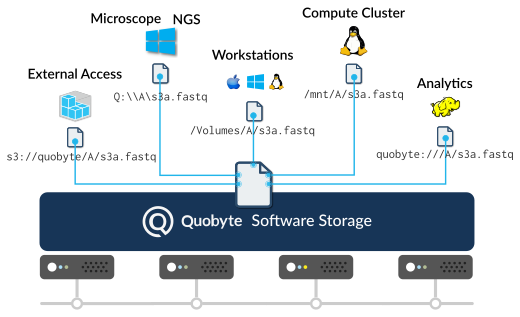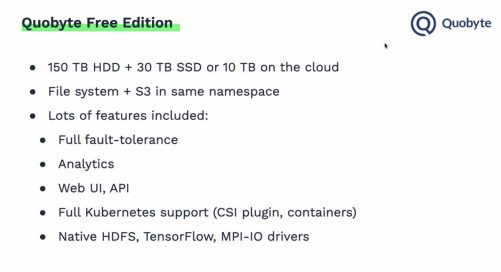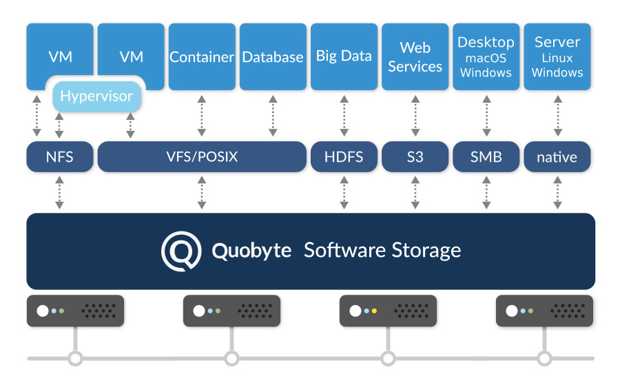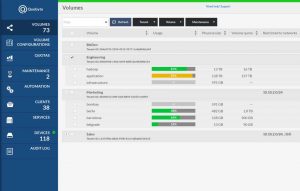Quobyte Enables Storage for Gen Scale-Out With Latest Version of Data Center File System
Provides 360 security, policy engine and cloud-like experience for mission-critical workloads on large scale.
This is a Press Release edited by StorageNewsletter.com on October 21, 2020 at 2:04 pmQuobyte Inc. announced details of its latest version of the Data Center File System, a deploy-anywhere, scale-out storage solution with new security features, a policy engine and simplicity of self-service to better enable low-latency and high-throughput workloads within a single system.
The company’s offer is a software-based distributed file system that offers unlimited performance, simplicity and seamless integration into any technology stack. It helps enterprises build a reliable, scalable and flexible software storage infrastructure to help keep up with the exploding amount of corporate data to provide a competitive edge. Version 3.0 of the Data Center File System builds on its previous successes to offer organizations additional features of multi-tenancy, 360 security and self-service.
“The industry continues to move towards infrastructures that require high-performance storage to supplement compute-intensive applications,” said analyst Randy Kerns, senior strategist and analyst. “What this means in practical terms is finding a solution that can support all workloads at any scale with linear scalability and performance, bullet-proof security, and simple, unified access. Quobyte’s powerful policy engine, holistic approach to data protection and storage-as-as-service usability makes it a viable candidate for deployment in organizations that are increasingly moving towards transactional processes and AI/ML workloads.“
Click to enlarge
Highlights of Quobyte 3.0 are:
-
360 security
-
-
Provides holistic data protection
-
End-to-end AES encryption (In transit/at rest/untrusted storage system)
-
Selective TLS support, e.g. between data centers
-
Access Keys for the file system
-
X.509 certificates
-
Event stream (metAdata: file access)
-
-
-
Policy engine
-
-
Control all aspects of a Quobyte cluster through flexible policies, from data redundancy, automatic recoding to immutability
-
Policies can be reconfigured at runtime without interruption of service
-
Automation ensures the optimal selection of redundancy and placement, including the new automatic policy that switches between replication and erasure coding as well as flash and HDD inside a file
-
-
-
Self Service
-
-
Storage-as-a-service/Cloud-like experience
-
Self-service for users from the web console
-
Automatic resource provisioning from Kubernetes
-
-
Additional features of Quobyte 3.0 includes a multi-cluster data mover with bi-directional sync, policy-based data tiering between clusters and recoding; and more native drivers, including HDFS and MPI-IO, which provide the benefits of lower latency and less memory bandwidth by bypassing the kernel.
“Cloud migration is propelled by intensifying workloads and data volume explosion. Quobyte’s cloud native solution offers a novel approach with a single, massive scale-out file system supporting a wide range of performance profiles with underlying multi-tier, flash storage,” said David Goldschmidt, VP and MD, Samsung Catalyst Fund. “Our investment in Quobyte underscores Samsung’s commitment to developing the core semiconductor technologies that can help more organizations unlock the potential of the cloud and harness the power of future innovations in storage technologies.“
Quobyte 3.0 is available through the company’s channel of VARs. These VARs, who are committed to providing their customers with a storage experience, help find the perfect infrastructure fit for their clients’ needs in order to maximize resources with minimal effort. Pricing is based on volume with unlimited capacity and unlimited clusters available. Discounts are available for academic institutions.
“One of the reasons why Quobyte resonates so well with our clients is that it works out of the box with their chosen hardware and infrastructure tools to help create an ideal technology stack that addresses their exacting needs,” said Tom Holt, VP, sales, West Region, reseller InterVision Systems LLC. “Elevating an already robust security and policy engine with the improvements built into 3.0, Quobyte is making it an easy choice for organizations looking to benefit from a high-performance, low-latency solution in a single system.“
The company’s solution is a single storage system that addresses many different performance profiles from the high-throughput, low-latency requirement of ML/AI to large block sequential, small block random or mixed general workloads. It supports a broad set of access protocols and clients, such as S3, Linux, Hadoop, Windows and NFS for greater platform flexibility and more complete data ingest and preparation. Data is readily available at any stage all within a single global namespace and all managed through the firm’s management console.
“With Quobyte 3.0, we continue to build on our legacy and experience by enhancing features that fully support storage for gen scale-out,” said Bjorn Kolbeck, CEO, Quobyte. “Developers, data scientists and site reliability engineers have embraced scale-out architectures. Users have become accustomed to using applications as though they are cloud native. We have answered those expectations and preferences with a new version of our distributed file system that addresses this paradigm shift while still providing the data protection and advanced security features that customers need.“
The company’s deploy-anywhere software is hardware agnostic, running on both bare metal and the public cloud. Interested parties can obtain the Free Edition for use in their data center with 150TB of capacity by visiting the company website.
Comments
Founded in 2013 in Germany with office in Santa Clara, CA, by CEO Bjorn Kolbeck, CTO Felix Hupfeld and former MD Jan Stender, Quobyte developed an interesting file system products.
It all started with XtreemFS around the mid-2000's when they were at Zuse Institute Berlin where they had the opportunity to build a pretty compelling open source file system. Then the founders moved to Google, quit the giant and launched Quobyte in 2013, the loop is closed.
One of the founder, Jan Stender, left the company at the beginning of 2019.
We found 18 employees on LinkedIn.
Quobyte got only 3 small funding rounds ($1 million twice in 2014 and $2 million in 2016) illustrating a sort of fragility, potentially limiting growth and marketing efforts while founders continue to control the company. It is always the same dilemma, especially in Europe, and, at the end, good technology doesn't reach the market in a reasonable way.
The team has a rare understanding of file system technology and has developed a new file system product named Data Center File System (DCFS), today considered as a good alternative to several commercial or open source flavors and being a true SDS.
It exists different philosophies on the market, but basically you expose industry standard file sharing protocols like NFS and SMB or an external file system via a Posix client software. DCFS can do both and even more as the image above shows. In other words, the firm provides classic NAS support via proxy software, but no parallel NFS, and also a parallel behavior.
The design of DCFS is a parallel file system with multiple metadata servers and data servers coupled in a very resilient way. DCFS is scale-out relying on a shared-nothing model from 4 to 1,000 nodes. All DCFS services run in userland able to support multiple Linux distributions. This convergence of HPC and NAS services with a pure software approach started to have some market adoption even if both the product and the company suffer from a lack of visibility.
And for HDFS lovers, you can even leverage DCFS for such needs. The product also offers access to the same content via multiple protocols. Imagine ingesting data via S3, also via proxy software, for IoT needs, and locally compute them via NFS or the reverse, upload a video file locally via SMB and give immediate remote access through S3.

This is why the team has decided to unveil a free edition, with up to 150TB of HDD or 30TB of SSD or 10TB in the cloud, to gain market footprint and potentially transform testers to users. But with this edition, you don’t receive erasure coding doing only replication, multi-tenancy is not possible, 360 security is not included as well.

Data protection is flexible with erasure coding and replication working by default at the volume level but also can be applied to individual files.
DCFS integrates a policy engine to optimize data placement, caching, quality of service, data expiration and tiering and offer easy multi-tenancy via a partitioning mode, namespaces and multi-filesystems.
On the AI side, DCFS has a native TensorFlow integration that increases performance I/O by 30%.
For container, Quobyte file system supports Docker, Kubernetes and OpenStack via CSI and Cinder and Manila. For Docker, the plugin offers a single access to multiple volumes and it can serve persistent volumes for K8s.
The cloud is also a real strategy for Quobyte with presence on AWS, GCP and Oracle Cloud. DCFS is only present on the GCP marketplace but you can run it on AWS, GCP and Oracle Cloud without this business presence, this page giving more details.
From a business point of view, the company charges its software based on volume and sells via channels and OEM, one of these being NEC under the product name QxFS connected to the Japanese’s supercomputer. NEC added QxFS to its long list in addition to LxFS for Lustre, BxFS for BeeGFS, GxFS for Spectrum Scale or ScaTeFS, a NEC development.
This 3.0 release introduced a free edition, and other key enterprise class features such 360 security with end-to-end AES encryption. X.509 certificates and access keys, does it mean the company is looking for a new round now? It should generate noise for sure and potentially change the adoption curve but other players like Qumulo, Vast Data and WekaIO are very active even if they arrived on the market later, they took positions difficult to shake.
Read also:
Tech Alert From QuoByte: Reducing Operational Costs of AI/ML Architectures
Storage performance to take advantage of investment, and building flexible environment that grows when needed without maintenance and management overhead
August 2, 2019 | Press Release
ISC: EUROstor Showing Software-Based Storage Solutions With PetaSAN and Quobyte
Configured and performance-optimized servers, depending on customer requirements, with up to 36x3.5-inches or 72x2.5-inches disks.
June 14, 2019 | Press Release
Company Profile: Quobyte
In software turning commodity servers into unified, high performing, scalable storage system
by Jean Jacques Maleval | August 8, 2018 | News














 Subscribe to our free daily newsletter
Subscribe to our free daily newsletter
